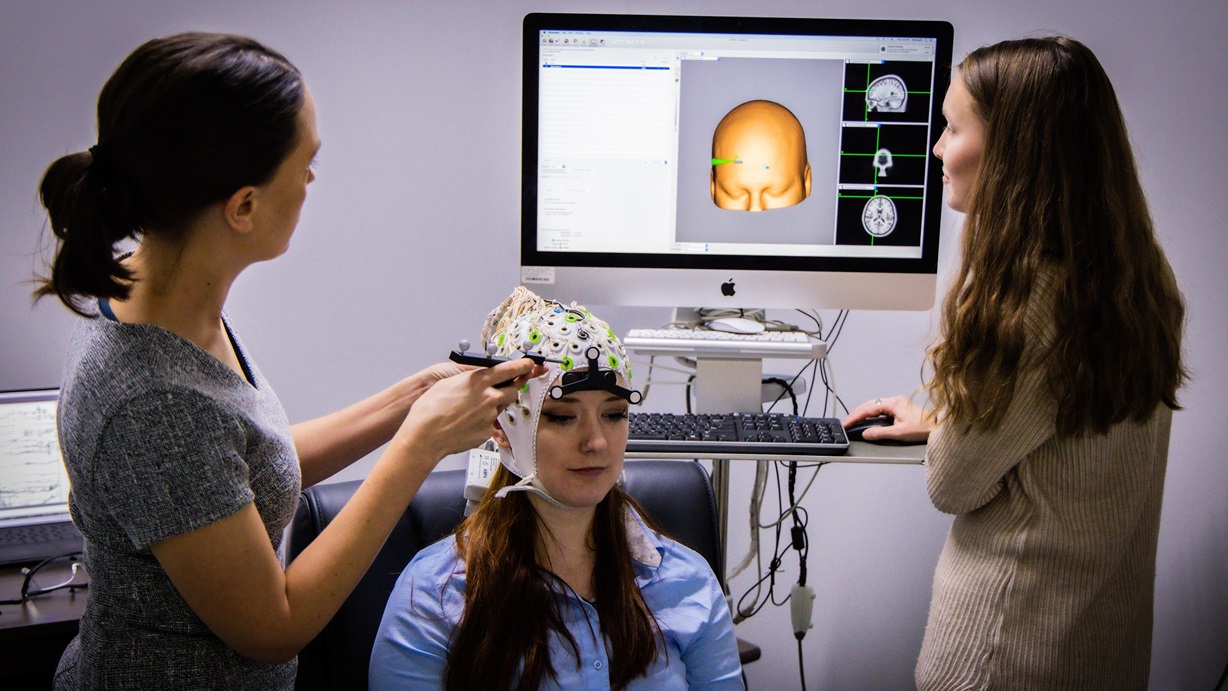March 28, 2025 | By Mike Strasser, Fort Drum Garrison Public Affairs
FORT DRUM, N.Y. — Soldier readiness is more than being physically and mentality fit to fight. Sleep is also a key component to readiness, as it directly impacts decision-making, reaction time, and overall performance. This is why it is one of the five domains under the Army Holistic Health and Fitness (H2F) program.
The Army H2F defines sleep readiness as the ability to recognize and implement sleep principles to support optimal brain function, emotional recovery, and physical recovery. “Sleep is a vital part of recovery,” said Capt. James Contessa, an occupational therapist with 2nd Brigade Combat Team H2F. “Without sleep, you can’t focus, you can’t think straight, and your stress levels go through the roof. So, if you’re not recovering, then essentially you can’t continue to perform at your best.”
Contessa said that data collected over the past two years indicate that brigade soldiers are getting less than the recommended amount of sleep – 7 to 9 hours – and it is an issue that H2F specialists are working with units to address. “Some people don’t even know there’s an issue because, for them, it’s their normal,” Contessa said. “It takes a lot of self-awareness and knowing what is not normal behavior.”
Contessa said the H2F team promotes sleep education as often as possible to reinforce that rest and recovery is essential to human performance optimization. “We advertise this a lot, and also knowing we have sleep counselors available for soldiers,” he said. “We get referrals from primary health managers, our PAs, and also our Behavioral Health team.”
During one-on-one sessions, Contessa said he asks soldiers to record their sleep habits for a week, including wake-up times, and the meals they are eating. “If any kind of flags pop up, we’ll discuss that,” he said. “Usually, it comes down to sleep hygiene and knowing the things that are affecting your sleep.”
Sleep hygiene refers to a person’s sleep environment and behavior. Contessa said this includes having a healthy sleep routine, like consistently going to bed at the same time each day. “After you have that protected sleep time established, you also want to have a sleep routine where you do the same things on a regular basis before going to sleep,” he said. “That way, you condition your body to know when it is time to sleep, and these are the things I’m doing to help myself get ready for that.”
Contessa said he recommends small, incremental changes at first. “There are a number of things you can do to change sleep behavior, but we try to make it manageable,” he said. “We set some goals and determine what are the small things you can do tonight to get better sleep. Letting people know they have the ability to control a lot of these actions and behaviors is often what leads to positive results.”
Capt. James Pilz said he always had trouble sleeping, but he didn’t realize how it impeded his performance until he enrolled in his college’s Reserve Officers’ Training Corps program. “Staying up late studying and waking up early for physical training interfered with my circadian rhythm, and I mostly relied on naps during the day and sleep supplements or prescriptions at night,” he said.
Pilz said his symptoms alleviated when he maintained a more consistent schedule, but he still struggled getting a full night’s rest. After experiencing severe insomnia, he turned to sleep medication but knew it was a short-term solution. “My biggest trouble is turning off my brain at night,” Pilz said. “I seem to be more awake at night compared to the daytime when I feel drowsy without stimulants. If something big is happening the following day, I get pretty anxious about it while lying in bed.”
Pilz discussed this one evening with his Brazilian Jiu-Jitsu partner, who also happens to be an H2F psychologist. He suggested a referral for Pilz to meet with Contessa. “We talked for about 30 minutes to an hour about my daily routine,” Pilz said. “He gave me some valuable pointers, and I left with pamphlets and worksheets to fill out. I felt confident leaving my appointment.”
\Pilz said he was able to adopt a consistent sleep schedule, to include weekends, and he also identified poor sleep habits to correct. “I would read every night before bed to help me sleep, but my biggest problem was that I was reading in bed,” he said.
Contessa said the bed should be associated with rest, and when people are reading or on their phones, it can become a disruptive habit. He also said if you can’t fall asleep within 20 minutes, then get out of bed. “Don’t watch TV, don’t turn on your phone, just get out of bed and so something restful,” Contessa said. “You change the environment. And then you only use the bed when it’s time to sleep so it no longer becomes a place of frustration, but a place of rest. This is a tough one, because at first you are restricting your sleep a little bit.”
Pilz also learned how caffeine affects sleep. Army H2F advises soldiers to avoid using caffeine, when possible, six hours before bedtime. Sleep studies have shown that the average person will still have half of the caffeine in their body five hours after consumption. “The closer you consume caffeine to your bedtime, the more caffeine your body is trying to fight against,” Pilz said. “I do not touch caffeine after 10 a.m. Even then, if I have too much early in the morning, I will feel it at night.”
Contessa said alcohol also limits quality sleep because it disrupts sleep cycles. “Alcohol is a depressant so, yes, you will fall asleep quicker,” he said. “However, you will not get that good, restful sleep – a deep sleep – for a long period of time, which is where the real recovery happens. Your sleep will be more shallow, easily prone to wake up, and then your body is also having to filter out all the alcohol and the toxins. You may get eight hours, but it’s not the same if you didn’t have that alcohol in your system.”
Contessa said that elite athletes recover just as hard as they play, and sleep is built into their training and competition schedules. “It’s not just their physical prowess that separates the top performers from the rest of the field,” he said. “It’s also those softer skills like stress management and sleep. I saw a soldier recently who is going to Ranger School, and she knows she is going to be sleep deprived during it because that’s part of the training. She wanted to know what are some cognitive or mental strategies to help combat sleep deprivation, and we had that conversation. So, it’s not just getting sleep to recover, but it’s also to perform.”
Soldiers across the 10th Mountain Division (LI) are introduced to H2F while in-processing through the Mountain Reception Company. Contessa said the 2BCT H2F program provides additional sleep education to units upon request, but they are also working to incorporate it into a regular training schedule when Soldiers work with the H2F team.
Sleep education is not exclusive to soldiers at Fort Drum. The Armed Forces Wellness Center offers a free Sleep Education class for service members, family members, Department of the Army civilians and retirees.
“This class covers general sleep education and things you can do to improve your overall amount and quality of sleep over time,” said Amy Ingersoll, AFWC health educator. “We want people to take a look at their habits over the course of an average day to see what could be impacting their sleep. As a society, we like to focus on the nighttime sleeping habits, but your entire 24-hour day affects when a person goes to sleep and wakes up. If you’re not consistent with those two times, that can throw off your entire rhythm for the day.”
Ingersoll said that improving one’s overall knowledge about sleep can make a difference, but they also offer individual sessions to address specific issues. “We can also provide more one-on-one assistance where we can do the PSQI (Pittsburgh Sleep Quality Index) questionnaire – which is 10 questions that looks over sleeping habits over the last 30 days. It’s also broken down into several categories, so we can see specifically what areas they are doing well in compared to areas that we can focus more on for improvement.”
Better sleep can ease stress, but sometimes it is stress that induces insomnia or other sleep disorders. The Fort Drum AFWC also offers a Stress Management class. “Essentially, we talk about why stress is detrimental to your health, the degrees of stress, and how to build awareness to your personal stress level,” said Liz Dial, AFWC health educator. “And then we help them to learn how to cope with stress with certain techniques like deep breathing, progressive muscle relaxation, guided imagery, and meditation.”
Dial said this is a prerequisite class before individuals can schedule stress management training, so that they better understand their biofeedback analysis. “In the individual sessions, we use a software technology to monitor their heartrate variance so we can see how they are responding to the stress management techniques,” she said. “We can help them practice different techniques to see which they are responding well to, and if they want, we can work on ones where they may be weaker in.”
The Healthy Sleep Habits class is offered from 9:30 to 10:30 a.m. every other Wednesday inside the AFWC, Bldg. 10550 on 5th Armored Division Drive. The next available class dates are April 2 (virtual) and April 16 (in-person).
The Stress Management class is scheduled from 9:30 to 10:30 a.m. every other Wednesday. The next available class dates are April 9 (in-person) and April 23 (virtual).
To register, call (315) 772-4608 or 772-4528.
For more information about the H2F Sleep Domain, visit https://h2f.army.mil/Domains/Sleep-Domain.




